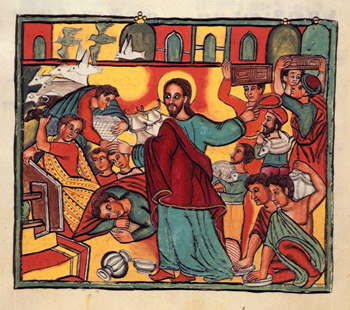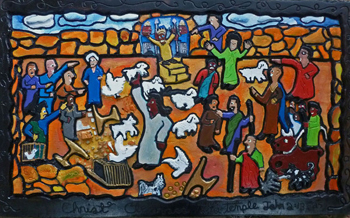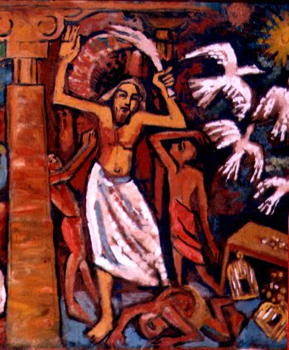From Our Archives
Debie Thomas, two essays on John 2:13–22, Not in God's House (2021); and The Temple of His Body (2018) ; and Dan Clendenin on 1 Corinthians 1:18–25, The Word of the Cross and the Wisdom of the World (2012).
For Sunday March 3, 2024
Third Sunday in Lent
Lectionary Readings (Revised Common Lectionary, Year B)
Exodus 20:1-17
Psalm 19
1 Corinthians 1:18-25
John 2:13-22
This Week's Essay
What are your earliest memories of Jesus? If you are white, American, and Protestant, you might remember a painting by Warner Sallman called The Head of Christ (1940) — Jesus with flowing blond hair and saccharine blue eyes. This portrait has been reproduced 500 million times around the world. Sallman's Jesus stares into space. He is clean, safe, and passive. It's hard to imagine why such a harmless looking citizen would be arrested, beaten to a pulp, and crucified by Rome; he wouldn't hurt a flea.
Sallman's painting is only one example of the many ways that we domesticate the deity, how we create Jesus in our own image, and co-opt him for our own purposes. The "cleansing of the temple" in John's Gospel this week challenges all such self-serving projections. The story warns us of what Donald McCullough calls "the dangerous illusion of a manageable deity." During this season of Lent, Jesus reminds us that he is the Great Disrupter.
It is a commonplace among biblical scholars that if we could somehow get behind the later and highly stylized "Christ of faith," and discover the earlier and unadulterated "Jesus of history," we'd understand him better. But I like the counterintuitive perspective of the historian Garry Wills. He argues that if we ever discovered the "real" historical Jesus, he'd become more rather than less mysterious to us. He'd look more like the epistle this week from 1 Corinthians 1:23, "to the Jews a stumbling block and to the Greeks foolishness."
 |
|
Jesus cleanses the temple, 17th-century Ethiopian.
|
The "cleansing" of the temple is a sanitized euphemism for the only violent act of Jesus that's recorded in the gospels. Were there other things said and done that were conveniently forgotten? Things too outrageous and egregious to preserve in print? But give the early church credit; it didn't flinch from this disconcerting memory. The cleansing of the temple is one of the stories that appears in all four gospels.
Matthew, Mark and Luke all place this story at the end of Jesus's ministry, sandwiching it between his triumphal entry into Jerusalem and the parable of the tenants (Mark 11:15–18 = Matthew 21:12–17 = Luke 19:45–48). John puts the story at the beginning of Jesus's ministry. In my Bible it's on the third page of his gospel, where, except for the wedding at Cana, it explodes off the page as Jesus's first public act.
The story echoes other occasions when people were understandably outraged by an unsafe Jesus — like the Transfiguration in the lectionary three weeks ago when the disciples were "terrified," when his family tried to apprehend him because they thought he was crazy, when his detractors were "afraid to ask him any more questions," when his hometown of Nazareth was "furious" with him and tried to kill him by throwing him off a cliff, or when some of his disciples quit following him because it was all just too much. Like these other stories, the cleansing of the temple reminds us that there's no "business as usual" with Jesus the Disrupter.
As an observant Jew, Jesus would have joined the 300,000 people who had crammed into Jerusalem to celebrate the Passover feast. At that time, the temple building epitomized the essence of Jewish faith in both literal and symbolic ways. It was a bustling nexus of commercial activity, crowds of worshippers, nationalist aspirations, political identity, historical memory, architectural splendor, and of religious affiliation.
In the temple, Jesus encountered people selling animals to the pilgrims who needed them to make their obligatory sacrifices. He met the money changers, too, for worshippers also needed to exchange their Roman currency into Jewish money in order to pay the temple tax in the coinage of the "sanctuary shekel."
At some point, as Jesus encountered all this religiously-oriented "business," he lost it and all hell broke loose. Incensed at the sacrilege of it all, Jesus improvised a whip, thrashed the animals from the temple, scattered the coffers of the money changers, and overturned their tables: "How dare you turn my Father's house into a market!" he screamed. Later, his disciples would remember Psalm 69:9 and attach a sense of prophetic fulfillment to this startling event: "Zeal for your house will consume me."
 |
|
Jesus cleansing the temple by Carl Dixon, mixed media on sculpted wood panel.
|
What was Jesus thinking with his sacrilegious violence in the sacred temple that day? Was it a spontaneous outburst or a calculated act? Maybe he objected to any and all commercial activity in the temple, even honest transactions that were necessary for pilgrims to fulfill their religious obligations. Or maybe he detested the exploitation and avarice of the religious authorities who controlled all access to ritual purity.
Whatever the case, Jesus didn't stop there. Things got even stranger. Jesus followed his violent act with an enigmatic saying. When asked to justify himself, he refused; instead of any justification or explanation, he said, "Destroy this temple, and I will raise it again in three days." Long after the event, his disciples interpreted this as "the temple of his body" and as a prediction of his death and resurrection.
So, what do this violent act and this dark saying mean? Some people see a prophetic prediction of the Roman destruction of the temple that occurred in 70 AD. A simpler interpretation suggests the purification of the temple to its sacred purpose, as a place of prayer for all people, without manipulation or exploitation by the religious gatekeepers. A third perspective sees a radical displacement — that we encounter God in the person of Jesus, and not in the temple building.
The disciples must have tossed and turned a sleepless night after all that craziness. It must have been terribly disconcerting to witness Jesus unhinged, throwing furniture, shouting at the top of his lungs, and flinging money into the air. Perhaps they ran for cover with the crowd. I would have. Did they look him in the eye the next morning, or shuffle their feet, stare at the ground, and make small talk?
The next day the religious leaders confronted Jesus in those same temple courts; the version in Mark says that "they were afraid of him," and so they demanded, "by what authority are you doing these things?" It's an honest question. We shouldn't be too hard on the religious bureaucrats. They were doing their job, keeping the peace, trying to reinstate the status quo. It was natural for the gatekeepers to question a boundary-breaker like Jesus.
 |
|
Jesus cleanses the temple by Jyoti Art Ashram.
|
But just as he had done the previous day, Jesus answered their question with his own question: was John's baptism truly divine or merely human? This trapped the temple guardians. If they said it was merely human, they feared reprisals from the adoring crowds. But if they admitted that John's baptism was from God, then they had no excuse for not accepting it and repenting. They were caught between fear of the crowd and disobedience to God. When they didn't answer Jesus's question, he didn't answer theirs: "Neither will I tell you by what authority I do these things."
And neither does Jesus answer all of my questions today, many of which are good and honest questions. Why did my mother suffer twenty years of clinical depression? Why do religious zealots burn people alive in cages? Why do millions of children die every year from drinking dirty water? Why was my neighbor's daughter born with a rare, horrible, and incurable genetic disorder? Why the violence, death, and destruction in Gaza and Ukraine?
Instead of answering my questions, in the Matthew 21 version Jesus tells a story. A lazy son refused to work but then changed his mind and obeyed his father's request. His brother did the opposite: he promised to work but then didn't. Jesus compared the temple authorities to the latter son. They made bold claims about their religious piety but did little. Tax collectors and prostitutes, said Jesus, entered the kingdom of God before them, for they promised nothing but nevertheless believed John the Baptist's message of invitation and indictment.
In The Lion, the Witch, and the Wardrobe, CS Lewis reminds us that the meaning of Jesus is neither tidy nor tame, but that it is nonetheless one that we can embrace with confidence. Susan and Lucy ask Mr. and Mrs. Beaver to describe Aslan (Lewis's representation of Jesus). They ask if Aslan is a man. Mr. Beaver replies.
"Aslan a man? Certainly not. I tell you he is the King of the wood and the son of the great Emperor-beyond-the Sea. Don't you know who is the King of Beasts? Aslan is a lion — the Lion, the great Lion."
"Ooh!" said Susan. "I'd thought he was a man. Is he — quite safe? I shall feel rather nervous about meeting a lion."
"That you will, dearie, and make no mistake," said Mrs. Beaver, "if there's anyone who can appear before Aslan without their knees knocking, they're either braver than most or else just silly."
"Then he isn't safe?" said Lucy.
"Safe?" said Mr. Beaver. "Don't you hear what Mrs. Beaver tells you? Who said anything about being safe? 'Course he isn't safe. But he's good. He's the King, I tell you."
The cleansing of the temple warns us of every false sense of security. Misplaced allegiances, religious presumption, pathetic excuses, smug self-satisfaction, spiritual complacency, nationalist zeal, political idolatry, and economic greed in the name of God are only some of the tables that Jesus would overturn today. Church should not be a place to reinforce my prejudices and illusions. Jesus disrupts what religion makes safe and cozy. He never once says "understand me." He says something far more radical. "Follow me."
Thank God, then, for the Psalm for this week which concludes with a prayer that is wonderfully appropriate during Lent: "Who can discern his errors? Forgive my hidden faults. Keep your servant from willful sins; may they not rule over me… May the words of my mouth and the meditations of my heart be pleasing in your sight, O Lord, my Rock and my Redeemer" (Psalm 19:12–14).
Weekly Prayer
Chaim Stern, ed.
Prayer for Overcoming Indifference
For the sin of silence,
For the sin of indifference,
For the secret complicity of the neutral,
For the closing of borders,
For the washing of hands,
For the crime of indifference,
For the sin of silence,
For the closing of borders.
For all that was done,
For all that was not done,
Let there be no forgetfulness before the Throne of Glory;
Let there be remembrance within the human heart;
And let there at last be forgiveness
When your children, O God,
Are free and at peace.From Chaim Stern, editor, Gates of Repentance (Central Conference of American Rabbis, 1978).
Dan Clendenin: dan@journeywithjesus.net
Image credits: (1) ArtBible.net; (2) SacredArtPilgrim.com; and (3) frchito.net.





